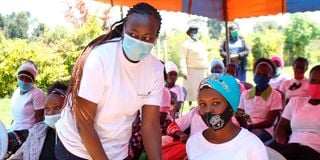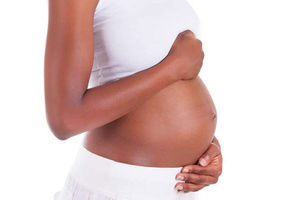Alarm as Kenya pulls out of regional accord on teen sex education

Save the Teenage Girl Initiative Founder Peris Wangari (left) presents gift hampers to girls after conducting a sex education drive at Kangari Catholic Church in Murang’a County in September 2020.
Kenya's Ministry of Health quietly pulled out of a major regional commitment to reduce HIV, sexually transmitted infections and teenage pregnancies after losing to civil society groups in Petition 266 of 2015, which challenged the withdrawal of the 2012 standards and guidelines.
United Nations Population Fund (UNFPA) Director Technical Division Julitta Onabanjo said Kenya has withdrawn from the Eastern and Southern Africa (ESA) ministerial commitment to comprehensive sexuality education. This comes after the Kenya Demographic and Health Survey (KDHS) 2022 revealed in January that almost half of Kenyan adolescents aged 15-17 do not know how to protect themselves from HIV/Aids.
Researchers investigating knowledge of HIV transmission among 17-to-24-year-olds also found that just over half of young people were aware of HIV prevention (54 per cent females and 55 per cent males).
In an interview with Nation on the sidelines of the just-concluded International Conference on Maternal, Newborn and Child Health, Dr Onabanjo said a number of African countries have done the same.
“It's been an uphill battle when it comes to sexuality, when it comes to talking about sex, it's something that UNFPA, civil society organisations and young people have been lobbying governments about so that they can get evidence-based education that will protect them," she said.
In its official commitment to ESA, Kenya had promised to expand comprehensive rights-based sexuality education, but later that year, the Ministry of Health withdrew the standards and guidelines in a letter dated December 3, 2013, and the subsequent memorandum dated February 24, 2014, banned the training of healthcare providers on comprehensive abortion care.
That's why, in 2015, civil society organisations went to court in Petition 266 of 2015, challenging the withdrawal of the 2012 standards and guidelines.
Landmark ruling
In a landmark ruling on June 12, 2019, the High Court ruled that the decision to withdraw the 2012 standards and guidelines and the training was unjustified, discriminatory, prejudicial and violated the rights of women and adolescent girls of reproductive age.
"They decided to pull the plug by quietly not renewing our commitments while Dr Stephen Kaliti, the former head of Reproductive and Maternal Health who took over the portfolio in July 2019, assured us that [he wouldn’t] allow Kenya to give contraceptives to teenagers and that the existing government policy was to rehabilitate those who were sexually active and not to give them the contraceptive," a senior health official, who spoke on condition of anonymity, told Nation.
In an earlier interview in April last year, the government claimed that giving contraceptives to minors was an offence punishable by up to 20 years in prison. Dr Kaliti then made it clear that such a move was against the Children's Act.
In February this year, Health Cabinet Secretary Susan Nakhumicha told Nation on the sidelines of the African Union summit that she would not allow teenagers to access contraceptives, despite a soaring HIV infection rate that she then put at 42 per cent.
"We have to teach our adolescents to abstain. I believe that, with a strong Christian foundation, they will learn to abstain," said the devout Catholic.
Ms Nakhumicha's sentiments came after a state visit by the Executive Director of the Joint United Nations Programme on HIV/Aids(UNAids), Ms Winnie Byanyima.
She pointed out that inequalities and injustices are fuelling the HIV/Aids pandemic and exposing groups of people such as young women and adolescent girls highly to HIV infection.
"Two out of three people living with HIV are women, while there will still be 1.5 million new HIV infections and 650,000 HIV/Aids-related deaths worldwide in 2021,” she said. Nation contacted Dr Edward Serem, the Director of Reproductive and Maternal Health at the ministry, who was non-committal.
“On the withdrawal of ESA commitments, I will respond fully soon when I am ready, but on condoms, I can assure you that I checked our stocks last month and we have enough," he said in a telephone interview on Tuesday. Ms Nakhumicha also did not respond to our text messages and phone calls.





